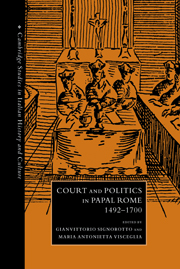Book contents
- Frontmatter
- Contents
- List of abbreviations
- Introduction
- 1 A turning-point in the history of the factional system in the Sacred College: the power of pope and cardinals in the age of Alexander VI
- 2 Court and city in the ceremony of the possesso in the sixteenth century
- 3 ‘Rome, workshop of all the practices of the world’: from the letters of Cardinal Ferdinando de' Medici to Cosimo I and Francesco I
- 4 The ‘world's theatre’: the court of Rome and politics in the first half of the seventeenth century
- 5 Factions in the Sacred College in the sixteenth and seventeenth centuries
- 6 The Secretariat of State as the pope's special ministry
- 7 The cardinal-protectors of the crowns in the Roman curia during the first half of the seventeenth century: the case of France
- 8 The squadrone volante: ‘independent’ cardinals and European politics in the second half of the seventeenth century
- 9 Roman avvisi: information and politics in the seventeenth century
- 10 Hegemony over the social scene and zealous popes (1676–1700)
- Index
- CAMBRIDGE STUDIES IN ITALIAN HISTORY AND CULTURE
1 - A turning-point in the history of the factional system in the Sacred College: the power of pope and cardinals in the age of Alexander VI
Published online by Cambridge University Press: 09 July 2009
- Frontmatter
- Contents
- List of abbreviations
- Introduction
- 1 A turning-point in the history of the factional system in the Sacred College: the power of pope and cardinals in the age of Alexander VI
- 2 Court and city in the ceremony of the possesso in the sixteenth century
- 3 ‘Rome, workshop of all the practices of the world’: from the letters of Cardinal Ferdinando de' Medici to Cosimo I and Francesco I
- 4 The ‘world's theatre’: the court of Rome and politics in the first half of the seventeenth century
- 5 Factions in the Sacred College in the sixteenth and seventeenth centuries
- 6 The Secretariat of State as the pope's special ministry
- 7 The cardinal-protectors of the crowns in the Roman curia during the first half of the seventeenth century: the case of France
- 8 The squadrone volante: ‘independent’ cardinals and European politics in the second half of the seventeenth century
- 9 Roman avvisi: information and politics in the seventeenth century
- 10 Hegemony over the social scene and zealous popes (1676–1700)
- Index
- CAMBRIDGE STUDIES IN ITALIAN HISTORY AND CULTURE
Summary
Recently it has been suggested that we need to reconsider the ethos of the Renaissance cardinalate, taking that concept not so much in terms of generic morality but more narrowly in the sense in which it was used in the later fifteenth century, that is to say as the necessary point of intersection between legal officium and ethical onus. In this perspective, the pontificate of Alexander VI Borgia (1492–1503) is of especial interest for the importance assumed in that period by what may be regarded as the factors leading to the decline of the Sacred College as an organ of government in the Roman church.
In the attempt to provide an historical interpretation of this process, it has been rightly pointed out that the exploitation of cardinalatial dignitas for purposes other than its institutional duties brought about its secularization. We find confirmation of this in the politicization of a conspicuous proportion of the Sacred College and in its domination by party politics, a phenomenon peculiar to the Renaissance age. One might add that the later reform of the cardinalate, during the ‘long century’ when the Tridentine decrees were being applied to the structures of the curia, was obliged to concentrate on neutralizing the power of the cardinals at the level of temporal politics, as a necessary prelude to the bureaucratization of the Sacred College.
The question is highly complex, and historians have not yet dealt with it in systematic and exhaustive terms.
- Type
- Chapter
- Information
- Court and Politics in Papal Rome, 1492–1700 , pp. 8 - 30Publisher: Cambridge University PressPrint publication year: 2002
- 3
- Cited by



